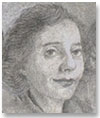|
 Born
in E. Prussia and educated at the universities of Kovno, Born and Berlin, Lea
Goldberg settled in Palestine in 1935, where she became one of Israel's leading
intellectuals and poets. A prolific and versatile writer, Lea Goldberg's literary
talent found expression in many genres. She was primarily a poet, writing of
childhood, nature, love, aging and death; her poetry is highly personal, introspective,
and modern in its understated (and often starkly simple) tone. Goldberg was
also a theater and literary critic, author of several children's works, a copious
translator, the author of a novel and a play, and founder of the Department
of Comparative Literature at the Hebrew University of Jerusalem (where she held
the chair from 1952 until her death). Born
in E. Prussia and educated at the universities of Kovno, Born and Berlin, Lea
Goldberg settled in Palestine in 1935, where she became one of Israel's leading
intellectuals and poets. A prolific and versatile writer, Lea Goldberg's literary
talent found expression in many genres. She was primarily a poet, writing of
childhood, nature, love, aging and death; her poetry is highly personal, introspective,
and modern in its understated (and often starkly simple) tone. Goldberg was
also a theater and literary critic, author of several children's works, a copious
translator, the author of a novel and a play, and founder of the Department
of Comparative Literature at the Hebrew University of Jerusalem (where she held
the chair from 1952 until her death).
Among Goldberg's outstanding
poems are Mi-Shirei ha-Nahal (Songs of the Stream).[1]
In these five poems she employs natural symbols such as river, stone, tree,
moon, and blade of grass as metaphors for the poet and the creative process.
The poet is equated with the river, with change and becoming.
We have selected two poems
here. In the first, the narrator is the tree, and he is addressing the river.
|
THE
TREE SINGS TO THE RIVER
He who carried
my golden autumn,
Swept away my blood with the leaf fall,
He who shall see my spring when it returns
To him with the turning of the year.
My brother, the river,
who is forever lost,
New each day and different and one,
My brother the stream between his two shores
Who flows as I do between spring and fall.
For I am the bud and
I am the fruit,
I am my future and I am my past,
I am the solitary tree trunk,
And you — you are my time and my song.
|
|
The tree is able to experience
change in its own cyclical changes — its budding
flowers and ripening fruit. The river, however, "is not changed by the
seasonal cycles as the tree is changed, for the river is an external phenomenon
which reflects what goes on within the tree, carrying away the leaves that the
tree casts off. The river, then, is process: it is movement and time; and yet,
though in constant flux ('new each day and different'), it remains a unity ('"one
and the same')…. Thus the river is the poem. The tree is the internality
that creates, the process, that makes itself known on the river of time."[2]
In this second poem
the narrator is a girl who is addressing the river. Here, the river clearly
alludes to Time.
|
THE GIRL
SINGS TO THE RIVER
To where will the stream carry my small face?
Why is he tearing my eyes?
My home is far away in a pine grove,
Sad is the swishing of my pines.
The river seduced
me with a joyous song
Caroled and called me by my name,
I went to him, following the sound,
I abandoned my mother's house.
I am her only
child, tender in years
And a cruel river is before me —
To where is he carrying my small face?
Why is he tearing my eyes?
|
|
Twice the girl questions
to where her small, young face is about to be carried off; she seems to recognize
that it is to some unknown point of no return, far away from the home of her
childhood. Twice also she asks why the river is "tearing" her eyes.
Writes Ezra Spicehandler: "The idiom likro'a eynayim can mean 'to
stretch the eyes in wonderment,'" but the literal meaning —
'to tear the eyes' — carried an ominous suggestion
associated with distortion and aging."[3]
The girl is aware that the river, as Time, is not only joyous in its song, but
also irresistibly seductive and even undeniably cruel. The river as Time is
reinforced in the phrase Pitani hanahal b'zemer-gil (the river has seduced
me with a joyous song): gil (joy) means both joy and age.
|
[1]
originally published Al ha-Perihah, 1948 [back]
[2]
Stanley Burnshaw, T. Carmi and Ezra Spicehandler, The Modern Hebrew Poem
Itself (London: Harvard University Press, 1989), pp. 125-26. [back]
[3]
Stanley Burnshaw, T. Carmi and Ezra Spicehandler, The Modern Hebrew Poem
Itself (London: Harvard University Press, 1989), pp. 127-28. [back] |
|
 The
Modern Hebrew Poem Itself, Stanley Burnshaw, Ariel Hirschfield&
Susan Glassman (Eds.), March 2002 The
Modern Hebrew Poem Itself, Stanley Burnshaw, Ariel Hirschfield&
Susan Glassman (Eds.), March 2002 |
|